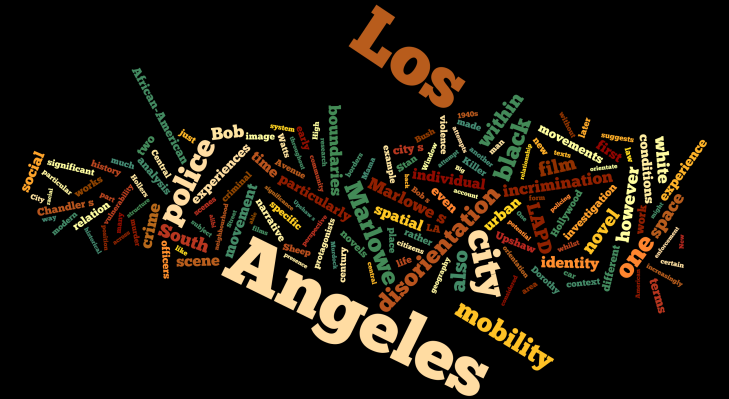At the University of Portsmouth I work as a Research Assistant on the Supernatural Cities project – an interdisciplinary group exploring how urban geographies are culturally constructed, negotiated and understood through supernatural, Gothic, uncanny, spectral and weird narratives. I am currently in the early stages of developing my postdoctoral research activity in relation to these themes, as well as developing a book proposal based upon my doctoral research.
I specialise in twentieth-century US fiction and cinema, with a particular focus on urban history, space and mobility.
I recently successfully defended my PhD thesis in the Department of English, University College London, titled Crime, Space and Disorientation in the Literature and Cinema of Los Angeles. The major themes of that research were:
- The history and culture of Black Los Angeles, particularly in relation to the geography of South LA.
- The Los Angeles School of Black Filmmakers (the ‘LA Rebellion’), particularly Charles Burnett (Killer of Sheep) and Haile Gerima (Bush Mama).
- The history of crime fiction set in Los Angeles – early hard-boiled writers such as Paul Cain and Raoul Whitfield; Raymond Chandler’s Philip Marlowe novels; the historical crime fiction of James Ellroy and Walter Mosley.
- The history of North American policing and criminalistic/forensic methods, particularly in terms of their attempts to monitor and restrict the movements of citizens.
- Theorizations of urban experience and spatiality – cognitive mapping (Lynch), territoriality (Sack) – and the conceptual history of (dis)orientation.
The full abstract for my project follows below.

Word cloud based on the full text of my final PhD thesis (created used Wordle)
Crime, Space and Disorientation in the Literature and Cinema of Los Angeles
Participation in the rhythms and processes of twentieth-century capitalism depended upon physical mobility, particularly in a city as geographically dispersed as Los Angeles. This fluid individual mobility also served to justify the introduction of new law enforcement practices that increasingly sought to rationalize urban space. How did the literature and cinema of Los Angeles represent the experiences of citizens for whom mobility was both vital and potentially incriminating? Within such an environment, I propose, successful orientation became particularly crucial. I develop an original but historically grounded theorization of disorientation as a concept through which to interpret the unease and vulnerability of individual protagonists as they navigate the city. Whilst drawing on a wide body of theoretical sources, my research remains rooted in the close analysis of cinematic and literary texts, and the specific historical and geographical context with which they engage.
The automobility of Raymond Chandler’s Philip Marlowe allows him to navigate the dispersed topography of 1940s LA, but his investigations are often ineffectual and leave him weary and jaded. The protagonist of Chester Himes’s If He Hollers Let Him Go (1945) struggles to orientate himself within a wartime Los Angeles in which racism is manifested spatially. Himes’s novel provides a lens through which to view the experience of 1970s South LA depicted in the films of Charles Burnett and Haile Gerima, in which the city’s African-American community confronts disorientating conditions of circumscribed movement and arbitrary incrimination. Law enforcement officials exert spatial control in the novels of Joseph Wambaugh and James Ellroy, but they also find themselves compromised by jurisdictional conflicts. Pursuing careful analyses of character, form and setting, this project explicates some of the compelling and troubling visions of urban experience that Los Angeles has prompted, and challenges a critical tendency to elide aspects of the city’s racial past.